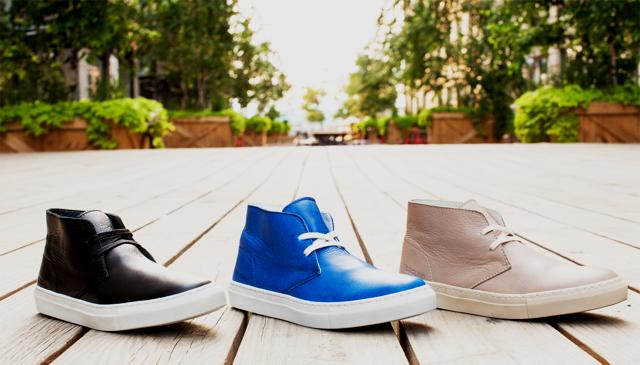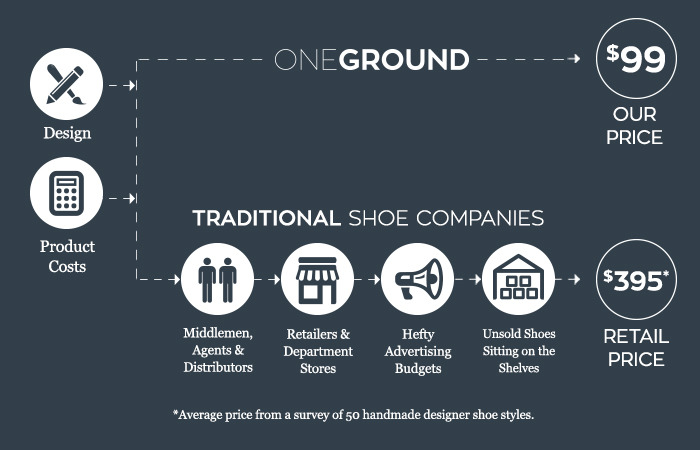Last year, Eamon Walsh returned from a work trip to Italy, where he had attended Micam, the largest luxury footwear show in Europe, with a suitcase full of shoes. Over coffee with his soon-to-be cofounder Nilton Duque, Walsh talked through a realization: that they could cut out the middlemen in the footwear industry, and therefore, sell a high quality shoe for a fourth or fifth of the price of a designer version.
“We looked at brands in other verticals, like Warby Parker for glasses and Baublebar for jewelry, that were cutting out the middlemen. And we thought, why can’t we do this for shoes?” said Walsh in an interview with BostInno.
So, Duque, who attended Iona College, and Walsh teamed up with Walsh’s Bentley University classmate and current co-founder Emre Ulasti, and the three got to building the first direct-to-consumer brand for footwear, OneGround. And in less than a year, it’s coming together: The company’s Kickstarter campaign, which launched last Tuesday, has already raised nearly $15,000 of its $50,000 goal in one week.
The brand’s first collection, which is made up of three styles of calfskin leather sneakers in three different colors, can be worn by both men and women. The OneGround team has crafted a slip-on sneaker, a low-top sneaker and a chukka in black, tan and cobalt blue, and each pair – which is handmade by artisans in Istanbul, Turkey – runs for $99.

According to Duque, OneGround’s shoes are best suited for the consumer that “knows luxury, but appreciates practicality.” The team felt frustrated that the affordable shoes out there, from retailers like Aldo, were low in quality. For instance, Aldo, Nilton said, uses imitation leather. Still, those who want designer quality shoes often can’t foot the bill, which can run upwards of $400.
But with their vertically integrated model, OneGround can offer a handmade shoe without the extreme markup that’s significant to the shoe industry – according to Duque, designer shoe brand markups are often about 10 to 12 times the production cost. Since OneGround operates the production and selling of every shoe, they can, along with their artisans in Istanbul, construct their own soles, use genuine leather, and even brand each pair with its own unique gold foil stamp on the inside.
“All these components make for a really amazing quality shoe,” said Duque. “And whether it’s a sneaker or more of, say, a boot in the future, we hope to keep those characteristics consistent.”
Walsh also pointed out another benefit of owning their production: OneGround can rapidly introduce new collections of styles and colors, keeping the product fresh and interesting. In the very near future, the team wants to roll out a dress shoe and a boot. While costs for such styles of footwear would increase, Walsh said they don’t anticipate prices to run higher than $159 a pair.

And this quick turnover gives them a third advantage: the company can immediately pick up on the trends seen in designer footwear, then recreate them at their much lower price points.
“[We can] find the top designer shoe that’s comparable and on trend, and we’re going to take that shoe, rip it apart and re-engineer it with our superior components,” said Walsh.
This edge reinforces the idea that, according to Duque, is engrained in their mission: the footwear industry is broken. Ask them why they think so, and they’ll ask how much time you have, but it whittles down to three reasons: price, as designer shoes are just too expensive; markups, as the markups in the shoe industry are higher than in any other apparel industry; and the timeline, as shoes take about a year to go to market.
“Those are the problems with the fundamentals of the industry and we’re coming up with solutions for all of those point by point,” said Duque. “It’s a new revolutionary experience within footwear.”
To learn more about OneGround and to support their Kickstarter campaign, click here. You can also follow OneGround on Facebook, Twitter and Instagram.
Correction: The headline has been updated to reflect that only two out of three founders, not all three, graduated from Bentley.
Images via OneGround

